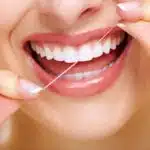
Why You Should Use Common Sense – At Least When It Comes to Oral Health
Common sense. Does it seem to you that this has become a rare commodity nowadays? Possibly, then, it is really uncommon sense that we should be talking about.
The latest example of an affront to logic – at least for me – lies in the latest media challenge to oral health. This morning various news agencies including The New York Times, suggested that maybe flossing is really overrated. Apparently, “officials” have never researched the effectiveness of regular flossing.
Now, millions of people are likely to jump on this as a justification for not flossing. But, in reality, the new media sensation is probably not going to change very much at the end of the day. Why? Because I can confidently tell you – based on more than 25-years of personal experience – most people don’t floss anyway. About all this latest “research” will promote is the possibility that some people will feel just a little less guilty about what others with any sense (common or uncommon) already understand is a pretty good idea.
But, it makes for good press. Doesn’t it?
Just for the sake of argument, let’s assume that flossing doesn’t remove plaque. Heck. Some people fail to remove plaque with a toothbrush. That doesn’t mean either fails to benefit the patient, if done properly. I can think of several reasons why flossing helps, though:
- Passing floss between the teeth sweeps out the contact point between them – meaning the points where they touch. That’s a source of about 30% of all tooth decay. Your toothbrush typically doesn’t reach those areas, unless you have gaps between your teeth. Floss does reach those areas.
- Flossing stimulates blood flow in the gums. One of the body’s first-line mechanisms of defense is to increase blood flow to an affected area. You are effectively helping your body do this in a controlled manner by flossing.
- A number of the bacteria under your gums are anaerobic bacteria. That means they don’t grow in room air. So what is a person introducing into the gum pocket when they pull back their gums by flossing? Could it be . . . air? Is it possible that the oxygen in the air could kill some of those bacteria as well?
Think about it.
If we can set aside this newly created question of doubt for just a moment, I would propose that you ask yourself the following question:
“Have I ever flossed consistently?”
By this, I mean every day, and it would have to have included doing so for at least two weeks.
This question is particularly directed to someone if they ever had a gum problem like gingivitis or periodontal disease. Sure, one needs to get rid of tartar and control bacteria as well, but for patients that make the effort to floss (and with only a few qualifications that I can think of), it is almost a sure bet that their gums got better as a result of the daily exercise. First of all, the gums probably bled less afterward. Not in the beginning – to be sure – but after about two weeks of flossing every day, we typically see positive change. Breath improves too. An overall sense of well-being is not out of the question either.
When it comes to flossing sporadically, I agree. It doesn’t help much. It’s kind of like exercising once or twice a month. And let’s face it, that’s where most of the population lives when it comes to flossing — once in a blue moon. Is regular exercise effective, though? What does your common sense tell you?
Why would I hold on to this idea in the face of “new evidence”? Well, I have seen flossing help too many times to just call it a coincidence. Hard core scientists might say “Oh, well, that’s just anecdotal evidence. It doesn’t stand up to real scientific scrutiny.” OK. Then survey practicing dentists. Let’s see if I’m the only one with that observation and experience. I doubt it.
I’m not saying flossing is the only thing you need to do to have healthy gums. It isn’t. Diet and good nutrition are paramount. A healthy immune system doesn’t hurt either. But for Pete’s sake, flossing is cheap, really not all that hard to do once you have practiced it for a while, and it can end up saving you a lot of money in the long run. With health care costs being what they are, I can’t think of too many actions a person can take that bear as much fruit and keep money in their pockets.
But, if the media has just succeeded in making you feel better about not flossing, then OK. Bully for them. (Heaven knows, they do a top notch job spending most of their time getting people to feel less than great.)
And, I suppose there are other ways to handle tooth loss – which, by the way, happens a lot more from gum disease than tooth decay.





